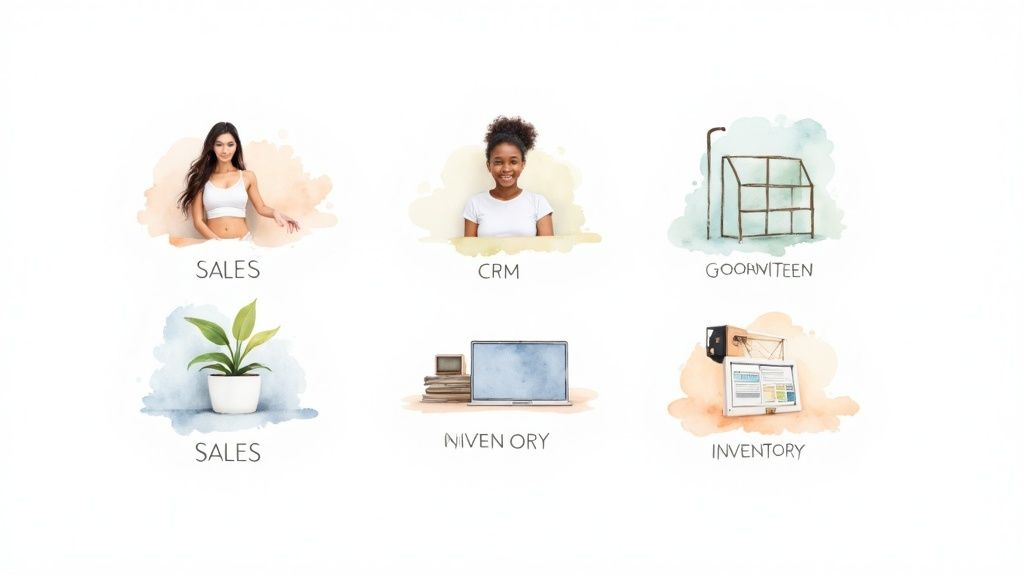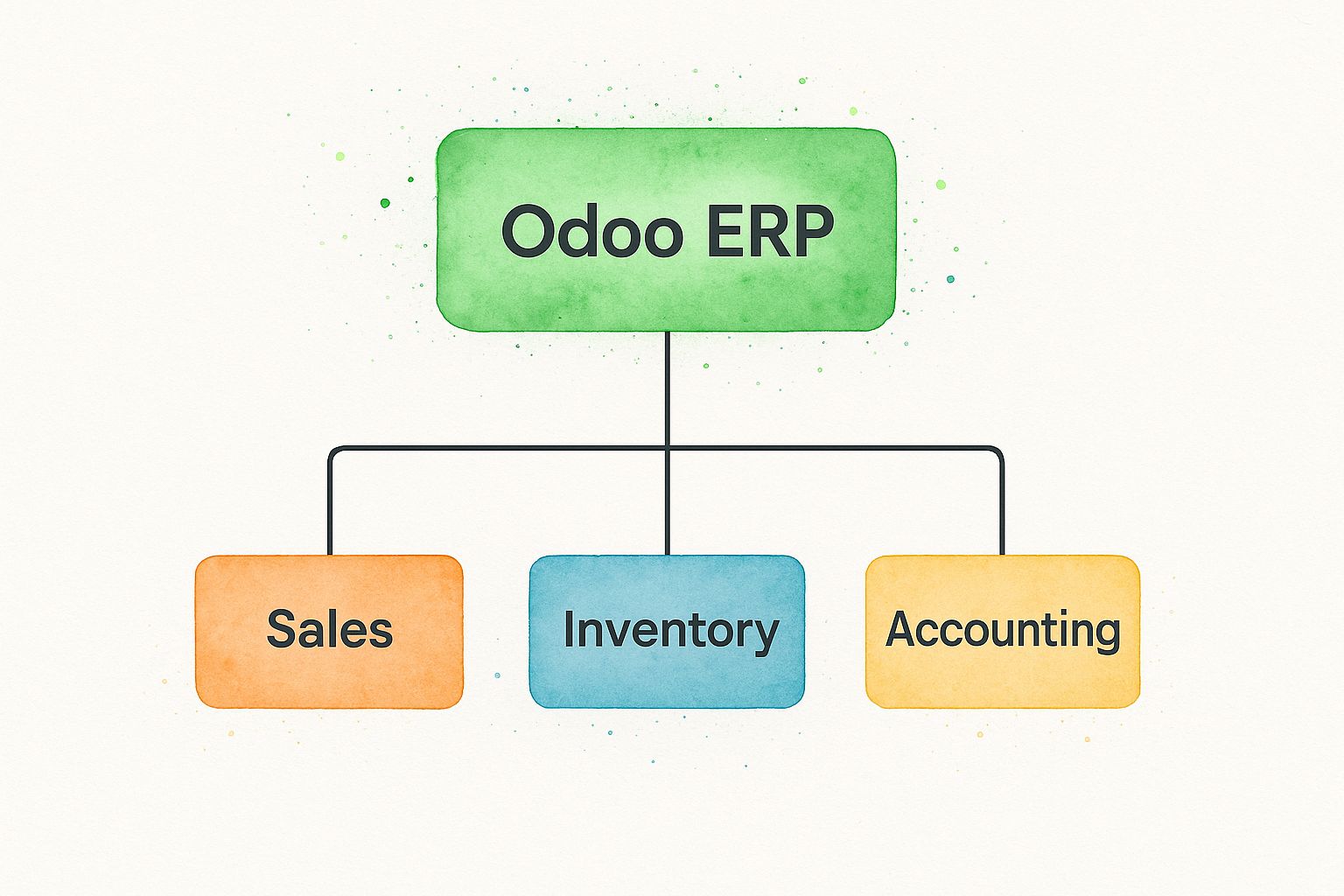Are you struggling with a jumble of software tools for your sales, inventory, and marketing? It's a common problem for growing businesses, leading to wasted time and fragmented data. Odoo cuts through that chaos, functioning as the central operating system for your entire company, bringing all your business processes together on one smart platform.
In this article, you'll discover what Odoo is, how it can boost your online visibility and sales, and why it's the perfect foundation for sustainable growth.
What is Odoo and why is it relevant for your business?

Imagine every part of your business—from the first customer email to the final invoice—working together perfectly within a single system. This isn't about adding just another app; it's about creating a single source of truth for your entire organization. That clarity is worth its weight in gold. It allows you to make smarter, data-driven decisions and truly streamline your workflows.
At its core, Odoo is a comprehensive suite of open-source business applications. The best way to think of it is like a set of LEGO blocks. You can start small, perhaps with just a CRM app for your sales team, and then add more blocks as your business grows and your needs change. This modular approach is one of its greatest strengths.
The power of an all-in-one platform
Many businesses are trapped in the "software silo" problem. You know the drill: your accounting software refuses to communicate with your inventory system, and neither syncs properly with your e-commerce platform. This is a recipe for inefficiency, low conversion rates, and unnecessary manual errors.
Odoo is designed to break down those silos. By connecting everything, you suddenly get a complete 360-degree view of your business operations.
- Increased Efficiency: When your sales team closes a deal, the system can automatically generate an invoice, update your inventory levels, and notify the warehouse team—all without anyone lifting a finger.
- Better Customer Experience: With a single overview of every customer interaction, everyone from sales to support can see the complete history. This leads to more personalized and effective conversations.
- Data that actually makes sense: Instead of piecing together reports from three different systems, you get real-time dashboards that show how the entire company is performing. Spotting trends, identifying bottlenecks, and understanding your marketing ROI becomes infinitely easier.
Odoo's philosophy is built on providing a single, cost-effective, and modular solution to run a business. It removes the technical and financial barriers that prevent companies from embracing truly integrated business software.
More than just an ERP system
Although Odoo is often placed in the Enterprise Resource Planning (ERP) category, it does much more than that label suggests. A traditional ERP system focuses mainly on back-office processes like finance and production. Odoo covers all of that but also integrates all your front-office needs.
For instance, Odoo has powerful modules for building websites, managing online stores, handling your social media, and sending email marketing campaigns.
This unique mix makes it a serious tool for any company striving for real, sustainable growth. It gives you the operational backbone of a classic ERP while also providing the marketing and sales tools you need to generate leads and retain customers. For us at Digitalique, who live and breathe digital marketing and e-commerce, that integration is invaluable.
By directly linking your marketing efforts to your sales and operational data, you can finally see the entire customer journey clearly. This enables incredibly precise optimization, improving everything from your lead generation to your final conversion rates. It's all about building a solid, scalable foundation for what's to come.
The evolution of Odoo: From TinyERP to global player
To truly understand what makes Odoo so powerful today, it helps to look back at where it came from. This platform wasn't an overnight success; it's the result of years of hard work, community collaboration, and a crystal-clear vision. For entrepreneurs, this story is more than background information—it's proof of the platform's stability and innovative spirit.
The journey began in 2005. Founder Fabien Pinckaers launched a small open-source project called TinyERP. The mission was simple but ambitious: to give smaller businesses access to the powerful management tools that, until then, were only available to large corporations with deep pockets. That core idea—making enterprise-level business software accessible—is still in Odoo's DNA.
The choice to be open-source was a game-changer. It opened the door for a global community of developers to contribute, fix bugs, build new features, and advance the software at a rapid pace.
From TinyERP to OpenERP
As the software became more capable, the name "TinyERP" no longer fit. It was anything but tiny. In 2009, it was rebranded as OpenERP, a name that better reflected its open-source roots and growing suite of business apps.
This period was marked by growth and professionalization. The platform became more robust, attracted larger companies, and built a network of official partners for implementation and customization. The focus shifted from a collection of useful tools to a fully integrated business management solution.
The birth of Odoo
By 2014, the platform had evolved again. It was no longer just an ERP system. It now offered a complete spectrum of business tools, from website builders and e-commerce to marketing automation. To reflect this all-in-one scope, it underwent its final name change: OpenERP became Odoo.
The name Odoo, an acronym for "On-Demand Open Object," marked a complete transformation. It was now a comprehensive suite of apps that could run an entire business from a single, unified platform. This move solidified its unique position in the market, combining the operational power of an ERP with the customer-facing tools of a modern sales and marketing platform.
This journey from TinyERP to Odoo isn't just a series of name changes. It represents a constant commitment to adaptation and innovation, guided by the real needs of its users.
Why is this history important for you as an entrepreneur? It shows that you're not investing in a fleeting tech trend. You're investing in a mature, reliable platform built for the long term. This is a system that has proven it can grow, adapt, and support businesses on their journey.
Discover the core modules of Odoo for business growth
The real magic of Odoo lies in its modular approach. Instead of forcing you into a rigid, one-size-fits-all system, you can choose the 'apps' or modules your business needs right now. As you grow, you simply add more modules. This flexibility makes Odoo an excellent choice for both a small startup and a large multinational.
Let's break down the essential modules for businesses, grouped by the problems they solve.
This diagram shows how Odoo's core apps for sales, inventory, and accounting are interconnected, forming the central nervous system of your business.

You can see how integrating these key areas creates a smooth flow of information, breaking down the data silos that so often hinder growth.
Boost sales and customer relationships
Let's be honest: for any business, managing customer interactions is crucial. A messy sales process and poor lead management lead directly to lost revenue. Odoo provides powerful tools to tackle this.
The CRM (Customer Relationship Management) module is the heart of your entire sales operation. Think of it as your digital command center for every lead and customer. It allows you to:
- Visualize your sales pipeline: Track every lead from initial contact to a closed deal in a clear, customizable pipeline. You instantly know where every opportunity stands.
- Automate follow-ups: Set reminders and activities so no lead slips through the cracks. Consistency is key to converting prospects into customers.
- Analyze performance: Get live reports on your team's performance, check conversion rates, and forecast future revenue with much more confidence.
Build your digital storefront
In today's market, you can't survive without a professional online store. Many businesses struggle with low website traffic and poor conversion rates, often because their website is completely disconnected from their daily operations. Odoo's web modules solve this problem structurally.
The Website and eCommerce modules work together, allowing you to build a beautiful, functional online store without being a coding expert. The drag-and-drop editor is simple, but the real power lies in the seamless integration with everything happening behind the scenes.
What does that integration mean for you? When a customer places an order on your Odoo website, your inventory is automatically updated, a sales order is created, and the accounting is prepared. This level of automation reduces manual work and eliminates costly human errors.
Furthermore, these modules have built-in SEO tools to support your SEO (Search Engine Optimization). You can easily adjust meta titles, create SEO-friendly URLs, and manage all your content—all from the same platform where you manage your products.
Streamline your operational processes
Operational efficiency is what separates a profitable company from one that's just busy. Manual inventory counts, cumbersome production processes, and a disjointed accounting system are silent profit killers. Odoo's operational modules are built to bring automation and clarity to these vital areas.
The rapid adoption of Odoo shows how effective it is, especially in fast-moving sectors. In some regions, for example, a high percentage of mid-sized food & beverage companies report using Odoo for their daily operations. This sector values the platform's ability to manage everything from inventory to customer relationships, where speed and accuracy are crucial.
A clear overview of Odoo pricing

Before you commit to new software, you need to understand the costs. That's just smart business. When it comes to Odoo, the pricing is refreshingly flexible and designed to grow with you, which is fantastic news for ambitious companies. Let's break down the costs so you can make an informed decision that fits your budget and goals.
Odoo's pricing revolves around two main versions: Odoo Community and Odoo Enterprise. They serve different needs, and understanding the difference is the first step to choosing the right one for your business.
Odoo Community: The free and open-source option
First, there's Odoo Community. This is the completely free, open-source version of the platform. And no, it's not a limited trial or a stripped-down demo; it's a powerful set of business tools you can download, install on your own server, and use forever without licensing fees.
This option is a brilliant starting point for startups, small businesses, or any company with a solid in-house technical team that's comfortable managing its own hosting and maintenance.
But "free" always has a few trade-offs:
- Limited functionality: You get core modules like CRM, Sales, and Invoicing, but you miss some of the advanced features from the paid version, especially in accounting and manufacturing.
- No official support: You're on your own for support. That means relying on community forums and your own technical expertise.
- Self-hosted: You are responsible for hosting, security, and updates.
Odoo Enterprise: The all-inclusive paid plan
Then there's Odoo Enterprise. This is the premium, paid version that unlocks every available app, offers professional support directly from Odoo, and provides a more refined user experience. It's built for businesses that need a complete, out-of-the-box solution with all the bells and whistles.
The pricing for Odoo Enterprise is surprisingly simple. It's based on a "pay for what you use" philosophy, determined by two factors:
- The number of users: You pay a fee for each person in your organization who needs access.
- The specific apps you choose: You select and pay only for the modules your business actually needs.
This modular approach is a huge advantage. You aren't stuck with a bloated system full of features you'll never use.
Odoo's price structure is a direct reflection of its scalability. It allows a business to start small and grow into a comprehensive ERP system without a massive, prohibitive upfront cost.
This model is also predictable, which makes budgeting much easier. For businesses looking for clear, manageable costs, this is a huge plus. At Digitalique, we believe in the same transparency, which you can see in our digital marketingplans.
Odoo's financial stability and growth also inspire confidence. The company's global revenue shot past €370 million in 2023, with bold forecasts to reach €1 billion by 2027. This impressive performance, driven by its adaptable and cost-effective model, resonates strongly in markets where businesses value scalable technology. Explore the trends shaping Odoo's growth through 2025 to get a better picture of the growing market influence.
Is Odoo the right choice for your business?
We come to the big question: is Odoo the right choice for your business? After exploring its history, features, and pricing, it's time to take stock. Let's weigh the key benefits and be honest about where it might not be the perfect match.
Odoo's greatest strength is its all-in-one, integrated design. For an ambitious SME drowning in a sea of disconnected systems, this is a true game-changer. If your team wastes hours manually syncing data between your sales software, inventory spreadsheets, and accounting tools, then Odoo was built to solve that exact problem.
Thanks to its modular approach, you only pay for what you need now, making it a system that grows with you, not one that holds you back.
When Odoo excels
Odoo is an exceptional choice if you recognize yourself in these scenarios:
- You're scaling up: You've outgrown your basic tools and now need a professional, central hub to manage growing complexity in sales, inventory, and customer relations.
- You need a single source of truth: Your decisions are delayed by conflicting data from different apps. Odoo gives you one unified dashboard for a clear, real-time overview of your entire operation.
- Efficiency is a top priority: You want to automate repetitive tasks—like invoicing, order processing, and marketing follow-ups—to free up your team for more valuable work.
When you should reconsider
However, we believe in transparency. Odoo isn't for everyone. If you're a freelancer who just needs a simple way to send invoices, the platform is likely overkill. Also, if your business has extremely niche, specialized software needs that don't fit neatly into standard modules, a fully custom solution might be more suitable.
The platform is powerful, but it requires a real commitment to set it up correctly.
Ultimately, the decision comes down to ambition and complexity. If you're managing multiple processes and striving for serious, sustainable growth, Odoo is one of the strongest contenders on the market.
If you're still weighing your options and think you might need a more tailored solution, we can help you define your requirements and map out the best path forward.
Frequently Asked Questions About Odoo
We often hear the same questions from entrepreneurs considering Odoo. It's a big step, so having doubts is completely normal. Here, we provide clear, honest answers to those common points, so you can get a good picture of the implementation and daily use.
Is Odoo difficult for my team to learn?
Odoo is known for its clean, user-friendly interface, which is a huge relief compared to older, clunky ERP systems. It's designed to be intuitive.
But let's be honest: like any powerful business software, there's a learning curve. Expecting your team to master it overnight isn't realistic. For a smooth transition, we always recommend a phased rollout, starting with one or two core modules. Combined with professional training, this approach ensures your team feels confident and supported from day one.
Can Odoo integrate with our existing software?
Absolutely. Odoo was built from the ground up as a platform that can easily work with other tools. It features a powerful API (Application Programming Interface), which you can think of as a universal power strip that allows it to connect with hundreds of other applications.
This means you can link it to essential tools you already use, from payment providers like Mollie to your favorite email marketing software. Many standard integrations are available out of the box, and custom connections can be developed for unique or specialized software.
How does Odoo help with our SEO and online marketing?
This is where Odoo truly stands out from traditional ERPs. The Website and eCommerce modules have built-in SEO tools. These let you manage things like meta titles and descriptions directly within the platform, without needing a separate tool for your on-page SEO basics.
But more importantly, real SEO success is about a great user experience. By integrating your website with the CRM and Marketing Automation modules, you create a seamless customer journey. This integrated approach increases engagement and keeps visitors on your site longer—both strong, positive signals for Google. A well-integrated system is the foundation for a powerful, data-driven marketing strategy.
Should you ever run into technical issues or need advice on optimizing your setup, our support team is ready to help. Contact our customer care helpdesk.
Ready to see how an integrated platform can strengthen your business operations and marketing results? Digitalique is your strategic partner in digital growth. We help companies leverage powerful tools like Odoo to build a solid foundation for the future.
Start growing with Digitalique today.. As always, leave your comment on what you thought of this article.